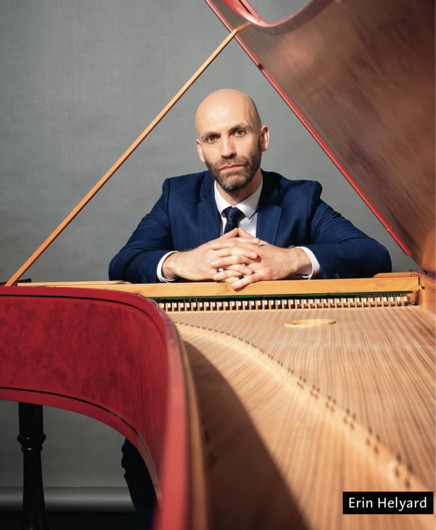Press GalleryCopyright © 2020 CBH & individual authors & photographers |
 BRETT BOARDMAN |
I first fell in love with the harpsichord through the radio. We had an upright piano in the house and I loved playing all kinds of music on it, but I never felt entirely comfortable playing some repertoire on the piano, Bach most especially. Something was wrong. When I first listened to the harpsichord I immediately thought: “what is this magnificent instrument that is so suited to counterpoint?” I thought it was beautiful: golden, flute-y, nasal, crunchy, and silvery. The harpsichordists I first listened to were the second wave of harpsichord pioneers, like Gustav Leonhardt, Bob van Asperen, Colin Tilney, and Scott Ross. So I wasn’t listening to Wanda Landowska on her enormous Pleyel instrument. The players on historical replicas were the ones that piqued my interest as a teenager.
I still remember the experience of playing my first harpsichord at the Conservatorium of Music in Sydney. It is an instrument that is still there – a German double by Von Nagel! I played some Scarlatti on it and immediately felt a rush of excitement at having the “software” (the music) To be a good harpsichordist it helps to be a bit of nerd, and highly curious and “hardware” (the instrument) align. So I knew this was the instrument for me.
| “To be a good harpsichordist it helps to be a bit of nerd, and highly curious.” |
I remember the first challenges of coming to grips with the instrument. The first was that I felt the quill pluck the key. I was used to the heavier action of the piano—the harpsichord action was much lighter but it was also somewhat “crunchier”. So you have to alter your technique quite a bit and I felt like it took me many years to be able to control the harpsichord. I always felt rhythmically unstable in the early days and I think a lot of pianists feel that way too, when they first play the harpsichord.
The harpsichord is wonderful in that it really encourages you to use your fingers as there is no pedal. (Incidentally, I find a lot of pianists still use a bit too much pedal as a crutch to playing smoothly – or legato – and the harpsichord really makes you “think with your fingers”, as Colin Tilney once said to me.) So you play more like an organist. You need a lot of finger substitutions to be able to play all that counterpoint smoothly and expressively.
It is impressive as a brash, rhythmic, and extroverted instrument as well. All the flashy brilliance of a Scarlatti sonata really comes to life on a harpsichord.
I think a lot of people have pre- conceptions about the harpsichord because they unfairly compare it to the piano. That seems wrong- headed to me. It is like comparing black-and-white cinema to the latest cinematic developments in colour, and preferring the latter without ever understanding the atmospheric beauty of the former. Pianos and harpsichords do different kinds of things, and composers wrote differently for them.
I prefer to see things in a more positive light. I hate it when people say: “well if Bach had a piano he would have loved it”. Well, he might also have loved electric light and steam trains and ballpoint pens, but he didn’t have them either, so that argument seems pointless. I personally love Bach on the piano, and I love Bach on the ondes Martenot too. But I love Bach best on the harpsichord.
This isn’t a particularly controversial or novel view although it annoys me that people still speak like this. As long ago as 1892, Anton Rubinstein said: “I think that instruments from every period have effects and colours that cannot be reproduced on today’s pianos – that compositions were always conceived with the instruments of their time in mind, and only on those can they achieve their full effect.”
What does it take to be a good harpsichordist? Well, it helps to be a bit of a nerd, and you should be highly curious. Also, it helps if you have thin and long fingers as the keyboards are a bit smaller. But most of all you will be a social animal, as the harpsichordist works with others all the time, whether supporting the singer in opera, as was done for over two centuries, or joining together with fellow instrumentalists in chamber music.
Harpsichords are expensive and I’ve never been able to purchase one. In my office I have an Italian single by Colin Booth that was bought for Pinchgut by some generous donors. For all other occasions I look to Carey Beebe who has every type we need: Italian, French, and Flemish harpsichords.
We are very lucky to have Beebe, one of the great harpsichord builders and technicians of all time in Australia. He has been a wonderful advocate of this beautiful instrument for decades and travels widely, making sure that instruments all over the world are in beautiful condition, ready to captivate fresh hands and ears.
| Photograph by Brett Boardman Limelight September 2019 |
| Site overview | |
| Harpsichords Australia Home Page |